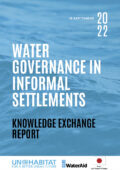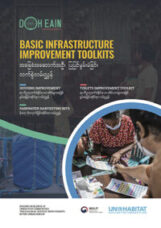WATER GOVERNANCE IN INFORMAL SETTLEMENTS – KNOWLEDGE EXCHANGE REPORT
The impact of COVID-19 is being most devastatingly felt in the world’s urban areas, especially the urban poor communities including in informal settlements. In addition, the COVID-19 pandemic has reminded us once again of the central role that water, sanitation and hygiene (WASH) plays in protecting us from diseases. In 2011, the UN Human Rights









